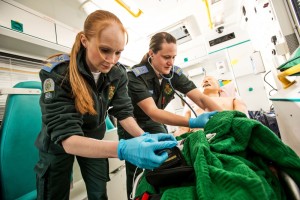Oil rig paramedics often have to take on an expanded health care role due to their large distance from clinics and hospitals. Oil companies would not be able to properly treat workers with injuries or ones who got sick if they did not have offshore paramedics.
For one to work as an oil rig paramedic he has to have the same health-based education as required in any other type of EMS work, meaning a minimum of a high school diploma and a CPR certificate.
Given the remote location and challenging working conditions of oil rigs, you would need a minimum of an associate’s degree to be prepared for working as an oil rig paramedic.

This job’s minimum educational requirements call for emergency medical training as well as advanced emergency training, or the equivalent of a total of 1,300 hours of classroom instructions and practical experience, as reported by the United States Labor Statistics Bureau.
A large number of offshore paramedics earn associate degrees as the very least while they are finishing their respective training.
They are to also pass certification exams via the National Registry of Emergency Medical Technicians, (NREMT).
Requirements often call for offshore paramedics to have more experience in the area – for example 5 or more years – before they are able to start working aboard oil rigs. They also receive bigger salaries due to the hazardous nature of their job – fires and explosions.
Duties of an offshore paramedic
- Paramedics working for oil rigs usually are located far from populated areas and are thus required to travel a lot when responding to certain emergency calls
- A paramedic will have to diagnose health problems via the observation of symptoms and patient interaction
- A paramedic will have to perform physical work, manipulating, lifting and carrying patients as well as heavy equipment like stretchers
- A paramedic will also have to repair and clean the said equipment while managing to keep track of inventory thus making sure he is ready to handle any potential emergency that might follow
Safety and medical solution groups are responsible for contracting paramedics out to oil rigs and providing them with additional training for tasks such as capturing electronic medical data and providing assistance for helicopter landing procedures. A number of medical solution providers may even offer advanced education programs for trauma care, clinical duties and cardiac life support. Given the particular medical solution company, a paramedic contracted for working on an oil rig might have to operate under a medical director’s supervision.
The Offshore Paramedic Salaries in the field vary in accordance with the geographical location of the given rig and the particular paramedic’s experience – $85,000 up to $90,000.
